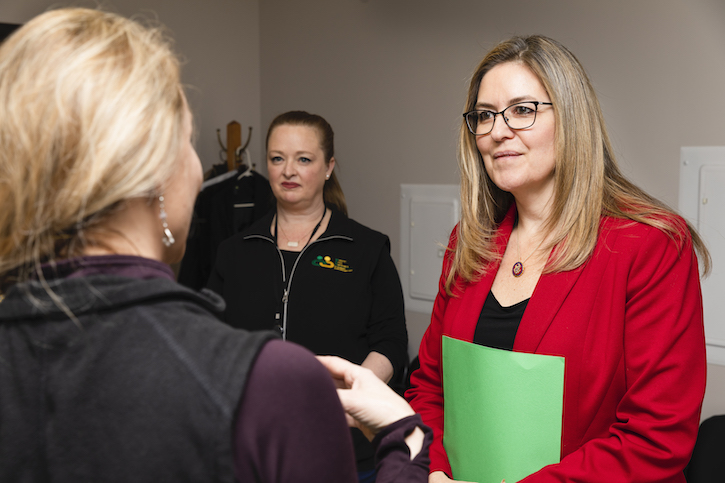
Rep. Jennifer Wexton (right) talks to Mason and Partners Clinic Coordinator Bridget Jennison, as Clinic Co-Director Rebecca Sutter looks on, during a visit to the Manassas Park MAP Clinic on Wednesday. Photo by Lathan Goumas.
U.S. Rep. Jennifer Wexton visited the Manassas Park location of George Mason University’s free health care clinic for uninsured patients Wednesday, learning about Mason’s extensive efforts to address the urgent health needs of low-income patients in Northern Virginia.
“It’s very impressive,” said Wexton. “I’m so glad to have Mason and Partners in the community.”
The Manassas Park location is one of three main Mason and Partners (MAP) interprofessional clinics where the university serves vulnerable populations in the communities within Prince William and Fairfax counties. Wexton spoke with MAP Clinics Co-Director Rebecca Sutter, MAP Clinics Coordinator Bridget M. Jennison and College of Health and Human Services Associate Dean for Academic Affairs Robert M. Weiler about the services offered at MAP clinics.
MAP’s Manassas Park clinic is located in Virginias 10th Congressional District, which Wexton represents. The other two main clinics are the Springfield MAP Clinic and the Culmore MAP Clinic, located in Culmore United Methodist Church in Falls Church. There are also seven MAP extension clinics in other locations, including Fairfax County Public Schools’ Dunn Loring Central Student Registration Center, where families can take care of school physicals and immunizations by appointment.
A Democrat, Wexton is in her first term in Congress. An advocate for increased research on opioid addiction, Wexton peppered Sutter and Jennison with questions about Mason’s efforts to fight opioid abuse and addiction. Sutter discussed MAP’s work on the Empowered Communities Opioid Project, designed to reduce the opioid-related deaths and health issues of recently released inmates.
The MAP clinics provide health care, school physicals, screenings and behavioral health services for vulnerable populations located in low income and medically underserved areas. Overall, more than 15,000 patients have been seen at MAP clinics, with more than $2 million in care provided and more than 2,000 school physicals, immunizations and developmental screenings.
The bridge care model provides short-term, high-quality, low-cost care addressing the needs of the uninsured population during a transition time. In addition, MAP clinics partner with community organizations to address factors that affect health, such as access to housing and food pantries for patients.
The clinics are staffed with Mason faculty and graduate and undergraduate students getting practical experience in the field.
